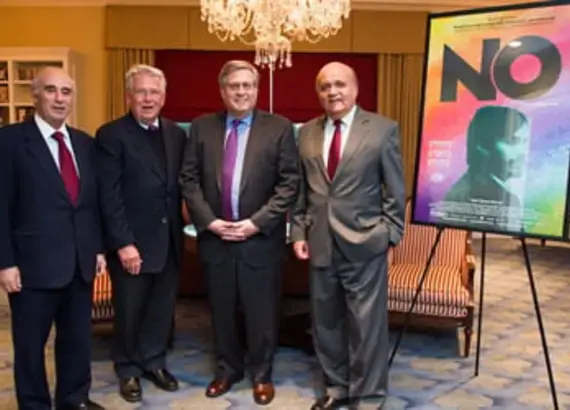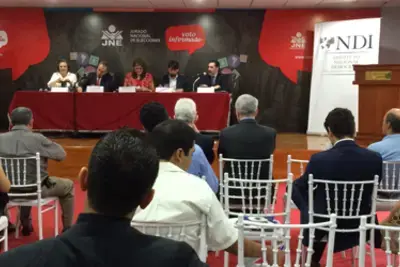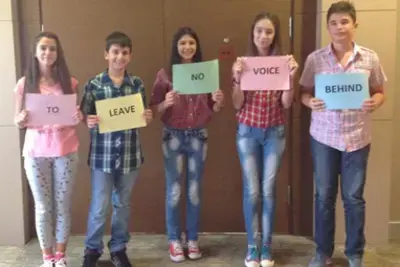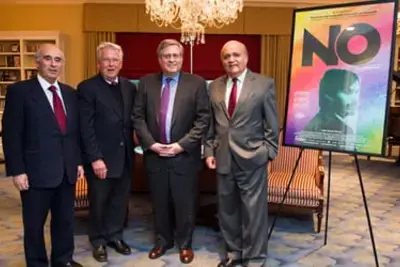
Success Story
Experts Revisit the Lessons from Chile’s “No” Campaign
Chile’s 1988 plebiscite — in which citizens voted to end the dictatorial rule of General Augusto Pinochet — was a pivotal event in that nation’s history, as well as in the history of democracy around the world.
The victory of the anti-Pinochet “no” forces came against significant odds, which were discussed by key participants in the campaign at a March 26 panel preceding a showing of the Oscar-nominated film “NO” in Washington, DC, at the Motion Picture Association of America (MPAA). The film, by Pablo Larrain, has drawn new attention to Chile’s return to democracy.
“After 17 years of the control of a dictator...the Chilean people rose and chose to chart a new course for their nation,” said former Senator Christopher Dodd, president of the MPAA, in opening remarks at the event. “It could have happened by military coups I suppose, as it happened in some other nations, but instead they used their voices and their vote to create change.”
The panelists discussed their experiences leading up to vote, their ability to bring together people from different ideologies to work for one goal, and lessons from their struggle that are still relevant for democrats around the world.
Speakers were Genaro Arriagada, former national director of the “NO” Campaign, former Chilean ambassador to the U.S. and former minister of the presidency of Chile; Sergio Bitar, president of Chile’s Foundation for Democracy, former Chilean senator, cabinet member and president of the Party for Democracy (PPD); and Frank Greer, partner at GMMB who worked on the No campaign. NDI President Kenneth Wollack moderated the discussion.
Providing a larger context to the events depicted in the film, the panelists discussed the atmosphere in Chile leading up to the referendum, the uncertainty of the outcome and the importance of international support, grassroots organizing and different political factions working together for a common goal.
“We realized that if we want[ed] to have a country for everybody, it was necessary to have a society which would be a place for everyone,” said Arriagada, speaking of the time after the campaign’s success. “That means not only our people — this was not a time of revenge — but also for the people that supported the dictatorship. It was necessary to create a democratic framework in which everybody is under the rule of law, nobody above the law, but at the same time every person deserves respect.”
 Sergio Bitar and Genaro Arriagada discuss their experiences during Chile's 1988 plebiscite before a screening of the Oscar-nominated film "NO" at the Motion Picture Association of America. Photo by Joy Asico.
Sergio Bitar and Genaro Arriagada discuss their experiences during Chile's 1988 plebiscite before a screening of the Oscar-nominated film "NO" at the Motion Picture Association of America. Photo by Joy Asico.While the film revolves around the advertising campaign surrounding the “no” vote, the participants noted that this was only one aspect of the efforts that lead to Chile’s return to democracy.
“There was a long process of convergence of political forces and social forces,” said Bitar, describing the years of efforts for free elections that led to the opposition choosing to participate in the plebiscite, despite unfair conditions.
“Even in a dictatorship, the worst mistake is to not participate,” Arriagada said of the importance of elections, even in unjust circumstances.
Bitar said that a critical aspect of the campaign was to create an atmosphere of optimism around the “no” vote, which would help inspire citizens to voice their opposition for Pinochet’s oppressive regime.
“The main obstacle was fear,” said Bitar. “And you cannot vanquish fear with fear.”
Greer stressed the importance of the grassroots organizing that went into the successful “no” campaign, including massive voter registration efforts. He also credited Chilean political parties with putting aside their differences to work for the vote.
“This coalition of political parties coming together was unprecedented,” he said.
The event was presented by NDI, MPAA, Participant Media, Sony Pictures Classics and the Inter-American Dialogue.
Published March 28, 2012



